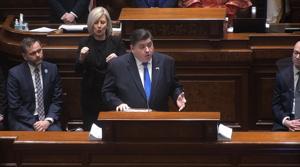(The Center Square) – Illinois taxpayers will know Wednesday how Gov. J.B. Pritzker plans to spend their money for the fiscal year that begins July 1.
The state’s total budget for fiscal year 2024, which ends June 30, is around $50.4 billion in state taxpayer funds. Adding federal and other state funds brings the total taxpayer cost for Illinois in the current fiscal year to nearly $170 billion.
Pritzker will deliver his proposed budget for fiscal year 2025 on Wednesday.
Illinois Comptroller Susana Mendoza said she hopes the governor delivers a balanced budget proposal.
“That we look to save in every opportunity that we can towards our rainy day fund and paying down additional pension obligations and that we hold the line on any kind of nonessential new spending,” Mendoza said at an unrelated event.
Illinois has been adding to its rainy day fund, reaching $2 billion last year, but Truth In Accounting CEO Sheila Weinberg said that can be misleading.
“For example, California has a big rainy day fund, but they have $250 billion of debt,” said Weinberg.
Illinois’ unfunded pension liability is around $140 billion. That does not include tens of billions in other post employment benefits for state retirees. Around $10 billion of the total fiscal 2024 spend of $50 billion goes to pensions.
Other costs continue to grow. State Sen. Chapin Rose raised alarm over the continued taxpayer costs from the state’s policy subsidizing health care for non-citizen adults and how that may impact a possible deficit he said nears $1 billion.
“Billion dollar debt, over a billion dollars in non-citizens. Are they correlated? Of course they’re correlated,” Rose said. “They’re correlated for anybody with common sense, anybody with an eighth grade education. But they’re not correlated to the Illinois Democratic party who has their head in the sand on this issue.”
Thursday, Pritzker announced an additional $182 million for the coming fiscal year to continue providing contracts for various other services to non-citizen migrants.
Other priorities the governor has already laid out include spending for early childhood, K-12 and higher education. Spending for K-12 education alone is around $10 billion in fiscal 2024.
In prior weeks, Pritzker has toured the state touting an increased number of child care positions through his Smart Start program that started in fiscal 2024 with around $250 million.
“For far too long, child care has been either unavailable, unaffordable, or both,” Pritzker said in a recent statement. “Smart Start’s nation-leading investments ensure that parents can access this vital resource alongside other essential supports to give their children the tools to succeed as early as possible.”
Such programs that could be announced by the governor Wednesday would join a range of other competing priorities.
Illinois Municipal League CEO Brad Cole is looking for cities to get their full share of the state’s income taxes through the Local Government Distributive fund.
“The difference is about a billion dollars a year,” Cole said. “So if you look at some of the things that state funds have been spent on in recent years, that’s being paid for on the backs of residents in communities who are not getting the full share of LGDF.”
Municipal leaders say if they don’t get their full share of LGDF, leaders may have to revert to local tax increases.
Other community groups are advocating for more taxpayer dollars. With a group of Black leaders working to reduce HIV and AIDS, Creola Kizart Hampton said they are looking for what they say is their share of funding.
“The state can not, will not get to zero unless African American led organizations get the equitable funding to address the issue,” Hampton said.
The Illinois Department of Public Health said they continue to strengthen their relationship with Black-led organizations. A department spokesperson said in the current fiscal year, every BLO grant applicant was awarded funding, totalling more than $5 million to a dozen grantees.
Also being proposed by legislators are child tax credits and changes to the estate tax for inherited farm property.
Legislators return Tuesday. The governor’s speech is Wednesday at noon in front of a joint session of the Illinois House and Senate.







